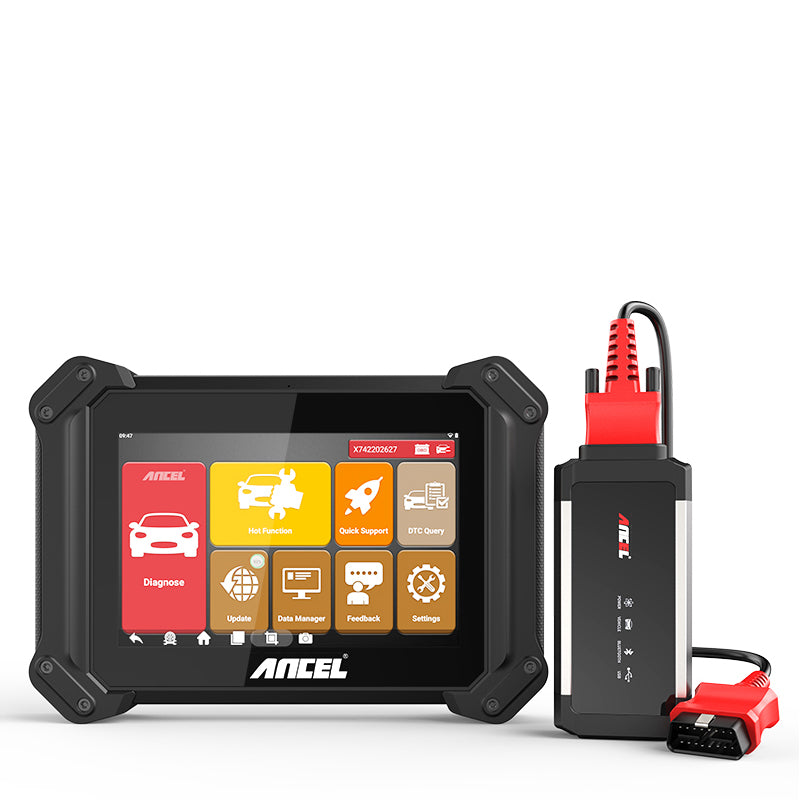This guide will walk you through various techniques to remove a broken key from your car’s ignition, ensuring you avoid further damage and get back on the road as quickly as possible.
For key programming an ANCEL car scanner like the ANCEL X7 or ANCEL V6 Pro could make the process much easier.
Obd2 scanner can help diagnose any issues with your car’s ignition system and ensure everything is functioning correctly.
Related Reading: Can an Aftermarket Key Fob Be Programmed by Anyone Other Than the Dealer
Tools You'll Need
You could gather the following tools:
-
Needle-nose pliers
-
Tweezers
-
Lubricant (WD-40 or graphite spray)
-
Broken key extractor kit
-
Super glue (optional)
-
Small jigsaw blade or coping saw blade
-
Paper clip
-
Magnet (optional)

Step-by-Step Guide
1. Assess the Situation
Determine how much of the key is stuck in the ignition. If a small portion is protruding, you may be able to grab it with pliers or tweezers.
If it's entirely inside, you'll need to use a broken key extractor or other tools.
Take a flashlight and inspect the keyhole carefully to understand the position and depth of the broken key.
2. Lubricate the Lock
Apply a lubricant like WD-40 or graphite spray into the keyhole. This helps loosen the broken key and makes it easier to remove.
Ensure the lubricant reaches deep into the lock by using the nozzle provided.
Spray generously and wait a few minutes to allow the lubricant to penetrate the mechanism.
3. Use Needle-Nose Pliers or Tweezers
If part of the key is sticking out, try to grab it with needle-nose pliers or tweezers.
Gently wiggle the key back and forth while pulling it out. Be careful not to push the key further into the ignition.
If the key is flush with the keyhole or barely protruding, use tweezers with a narrow tip for better precision.
$439.99
4. Broken Key Extractor Kit
A broken key extractor kit is specifically designed for this purpose. Insert the extractor tool into the keyhole alongside the broken key.
Twist and pull gently to catch the key and pull it out. These kits are highly effective and worth having on hand.
They usually include various hooks and spiral extractors, which can grab onto the key and pull it out.
-
Select the appropriate extractor tool from the kit.
-
Insert it carefully into the keyhole, aligning it with the broken key.
-
Twist the tool slightly to hook onto the key.
-
Pull the extractor tool out slowly, bringing the broken key with it.
5. Super Glue Method
This method should be used with extreme caution:
Apply a small amount of super glue to the end of a thin wire or paper clip.
Insert the wire into the ignition, ensuring it contacts the broken key.
Hold it in place until the glue dries.
Carefully pull the wire out, bringing the broken key with it.
Be cautious with this method as too much glue can damage the ignition or make the situation worse.
Use a minimal amount of glue and ensure it doesn't touch the ignition's internal components.
6. Jigsaw Blade or Coping Saw Blade
A small jigsaw or coping saw blade can be an effective tool:
Insert the blade into the ignition with the teeth facing upwards.
Hook the teeth onto the broken key.
Pull the blade out slowly, bringing the broken key with it.
Choose a thin blade that can fit into the keyhole without forcing it.
The teeth of the blade should be fine enough to catch the broken key without causing further damage to the ignition cylinder.
7. Magnet Method
If the broken key is made of a magnetic metal, you might try using a magnet:
-
Place a strong magnet against the ignition.
-
Move it around gently to attract the broken key.
-
Pull the magnet away, bringing the key with it.
Use a high-powered magnet for this method, as weaker magnets may not have the necessary strength to pull the key out.
This method is less common but can be effective for keys made of magnetic materials.
Preventing Future Issues
Use a spare key if the original shows signs of wear. Keys that are worn or bent are more likely to break.
Avoid applying excessive force when turning the key. If the key doesn't turn easily, there may be an issue with the ignition or the steering lock.
Regularly lubricate the ignition to ensure smooth operation. Periodic maintenance can prevent the buildup of debris and corrosion inside the ignition cylinder.
Conclusion
By following the steps outlined above, you can effectively remove the broken key without causing further damage to your vehicle.
If you're unable to remove the key yourself, it's always best to seek professional assistance to avoid costly repairs.
FAQs
Can a broken key damage the ignition cylinder?
Yes, a broken key can damage the ignition cylinder if not removed carefully. The broken pieces can get lodged deeper into the cylinder, causing more extensive damage and making the removal process more difficult.
What are the signs that my ignition cylinder is damaged?
Signs of a damaged ignition cylinder include difficulty turning the key, the key getting stuck, the car not starting, and unusual noises when turning the key. If you notice any of these signs, it’s best to have the ignition inspected by a professional.
Will removing a broken key void my car's warranty?
Removing a broken key should not void your car's warranty, but it's always best to check with your car manufacturer or dealer. If you cause additional damage during the removal process, it may affect warranty coverage.















